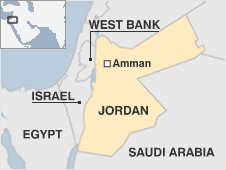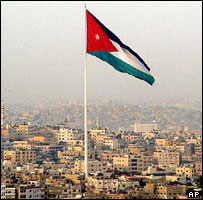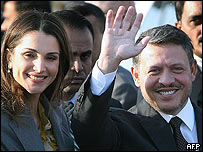 |
The Hashemite Kingdom of Jordan is a small country with few natural resources, but it has played a pivotal role in the struggle for power in the Middle East.
Jordan's significance results partly from its strategic location at the crossroads of what most Christians, Jews and Muslims call the Holy Land. It is one of two Arab nations to have made peace with Israel and is a key ally of the US.
Overview
The desert kingdom emerged out of the post-World War I division of the Middle East by Britain and France.
AT-A-GLANCE
 Politics: Real power rests with the king, who has promised to press ahead with reforms; multi-party politics was introduced in 1992
Economy: Jordan has few natural resources; its economic fortunes have been undermined by instability within the region; it is heavily dependent on aid but the economy has been growing
International: The government's pragmatic, non-confrontational line in foreign relations is often at odds with the more militant approach of Palestinian and Islamist interests
|
The population at that time was made up largely of bedouin tribesmen, who were followers of King Hussein's grandfather, Abdullah - himself originally from Arabia.
Today, these families - known as East Bank Jordanians - are outnumbered by the descendants of Palestinian refugees from Israel and the West Bank.
The death in February 1999 of King Hussein, who ruled for 46 years, left Jordan still struggling for economic and social survival, as well as regional peace.
His son, Abdullah, who succeeded him to the throne, faces the task of maintaining stability while accommodating calls for reform. A blueprint for long-term political, economic and social change - known as the National Agenda - has yet to be implemented.
Jordan's reputation as one of the region's safest countries was dealt a blow in late 2005 when dozens of people were killed in suicide bomb attacks on hotels in the capital. Iraq-based Islamic militants claimed responsibility. The king said Jordan had been targeted because of its location and its stances.
Unlike many of the states in the region Jordan has no oil of its own. Its resources are limited to phosphates and agricultural produce. The economy depends largely on services, tourism and foreign aid, for which the US is the main provider. Jordan prides itself on its health service, one of the best in the region.
Facts
- Full name: The Hashemite Kingdom of Jordan
- Population: 6.3 million (UN, 2009)
- Capital: Amman
- Area: 89,342 sq km (34,492 sq miles)
- Major language: Arabic
- Major religion: Islam
- Life expectancy: 71 years (men), 74 years (women) (UN)
- Monetary unit: 1 Jordan dinar = 1,000 fils
- Main exports: Phosphates, fertilisers, agricultural products
- GNI per capita: US $3,310 (World Bank, 2008)
- Internet domain: .jo
- International dialling code: +962
Leaders
Head of state: King Abdullah II
King Abdullah II, Jordan's monarch since 1999, has had to steer a tricky political course. The country's peace agreement with Israel and its close ties with the US are unpopular with many Jordanians.

King Abdullah and Queen Rania
|
At home, the king backs a 10-year programme for political, social and economic reform and supports a plan for elected local councils. Conservative legislators are apprehensive about the proposals.
In the wake of the November 2005 suicide bombings in Amman the king declared that security and stability were top priorities and called for a strategy to deal with the "changed circumstances".
Abdullah is the eldest son of the late King Hussein and his British-born second wife, Toni. The couple divorced in 1972. Born in 1962 and educated in Britain and the US, he was named as crown prince shortly after his birth. The king transferred the title to his own brother, Hassan, in 1965, only to return it to Abdullah in 1999.
He is married to a Palestinian - an asset since most Jordanians are of Palestinian origin - and enjoys car racing, water sports and collecting antique weapons. He is a career soldier and once led Jordan's special forces.
The king has extensive powers; he appoints governments, approves legislation and is able to dissolve parliament.
Media
The Jordanian media have traditionally been under tight state control.
The media rights body Reporters Without Borders (RSF) says the authorities "use interference and hidden pressure to control the press".
The BBC Arabic Service and France's Monte Carlo Doualiya are available on FM in Amman and in northern Jordan. Private, music-based FM radio stations have sprung up.
Around 16% of Jordanians had internet access by 2007. Officials have pledged to get 50% of the population online by 2011, partly by cutting the cost of web access. RSF says the internet is just as "closely watched" as traditional media.
The press
- Ad Dustour ("The Constitution") - Arabic-language, privately-owned daily
- Al Ra'y - Arabic-language, privately-owned daily
- Al Ghadd - Arabic-language, privately-owned daily
- Al Arab al Yawm - Arabic-language, privately-owned daily
- Jordan Times - English-language daily, sister publication to Al Ra'y
- The Star - English-language weekly, sister publication to Ad Dustour
Television
- Jordan Radio and Television - state-run, operates main network Channel One, sports network Channel Two, film network Channel Three and Jordan Satellite Channel
Radio
- Jordan Radio and Television - state-run; services in Arabic, English and French
- Radio Fann - FM entertainment station run by armed forces
- Rotana FM - private, entertainment-based
- Mood FM - private, pop music
- Play 99.6 - private, pop music
News agency
-
Petra - state-run, operated by Information Ministry
AFRICA | ASIA-PACIFIC | AMERICAS | EUROPE | MIDDLEEAST | SOUTHASIA
Mauritania Mauritius Morocco Mozambique Namibia Niger Nigeria Republic-of-congo Rwanda Sao-tome-and-principe Senegal Seychelles Sierra-leone Somalia South-africa Sudan Swaziland Tanzania The-gambia Togo Tunisia Uganda zambia Zimbabwe Australia Brunei Burma Cambodia China East-timor Fiji Indonesia Japan Kazakhstan Kiribati Kyrgyzstan Laos Malaysia Marshall-islands Micronesia Mongolia Nauru New-zealand North-korea Palau Papua-new-guinea Samoa Singapore Solomon-islands South-korea Taiwan Tajikistan Thailand The-philippines Tonga Turkmenistan Tuvalu Uzbekistan Vanuatu Vietnam Antigua-and-barbuda Argentina Bahamas Barbados Belize Bolivia Brazil Canada Chile Colombia Costa-rica Cuba Dominica Dominican-republic Ecuador El-salvador Grenada Guatemala GuyanaHaiti Honduras Jamaica Mexico Nicaragua Panama Paraguay Peru St-kitts-and-nevis St-lucia St-vincent-and-the-grenadines Suriname Trinidad-and-tobago United-states-of-america Uruguay Venezuela Albania Andorra Armenia Austria Azerbaijan Belarus Belgium Bosnia-hercegovina Bulgaria Croatia Cyprus Czech-republic Denmark Estonia Finland France Georgia Germany Greece Hungary Iceland Ireland Italy Latvia Liechtenstein Lithuania Luxembourg Macedonia Malta Moldova Monaco Montenegro Norway Poland Portugal Russia San-marino Serbia Slovakia Slovenia Spain Sweden Switzerland The-netherlands Turkey Ukraine United-kingdom Vatican Algeria Egypt Iran Iraq Israel-and-palestinian-territories Jordan Kuwait Lebanon Libya Mauritania Oman Saudi-arabia Sudan Syria Tunisia United-arab-emirates Yemen Afghanistan Bangladesh Bhutan India Nepal Pakistan Sri-Lanka The-Maldives

